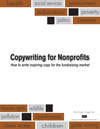In 2011, have you thanked your donors, volunteers, advocates and members for their past support of your organization? Send out a quick cultivation email TODAY. January 11th is International Thank You Day and the perfect tie-in for a cultivation message.
Thank them for all they did in 2010. Wish them a Happy New Year. And let them know what you have planned for this year in 2011.
As you list all the accomplishments … phrase it so it’s clear your supporters made this possible. Don’t say, “In 2010 Acme Charity did this and that.”
And as you look ahead for what you want to achieve in 2011 . . . as you highlight the work yet to be done . . . phrase it so your supporters feel needed and realize that this is what they (i.e., donors, advocates and members) can help make happen and why their support is still needed.
In other words, use donor-centric copy (member-centric) in your message.
I recommend you make this a pure cultivation email with “zero ask” for money. If available, you might link to an online video or story that also highlights your plans for 2011 as a call-to-action in your email. Start off the year right by expressing your gratitude to those who support your nonprofit organization.

{ 1 trackback }
{ 2 comments… read them below or add one }
Great post! I completely agree that you shouldn’t include an ask – you should focus strictly on the thanking. I think lots of nonprofits would be much better off if they did this at least once per year.
Sandy Rees
Fundraising Coach
Thanks Sandy. Yes, nonprofits do need some “pure” cultivation communications in the mix. And since not everyone is likely to be on their email list, they also ought to do some cultivation by direct mail. Even a postcard here and there would work for those on a really tight budget.
I often illustrate the impact of this to clients and others by asking them, “Would you want a friend to ask you for money, or to ask you for a favor every single time you heard from her? Of course not. And donors feel the same way about hearing from your charity. True, they’ll tolerate more “asks” from you than from a friend. But you still need to refrain from asking for a donation every single time.”